Tears of Gold
In a special exhibition to mark World Refugee Day, British artist Hannah Rose Thomas shows portraits revealing the trauma and resilience of women who have survived violence and displacement.23 June 2022
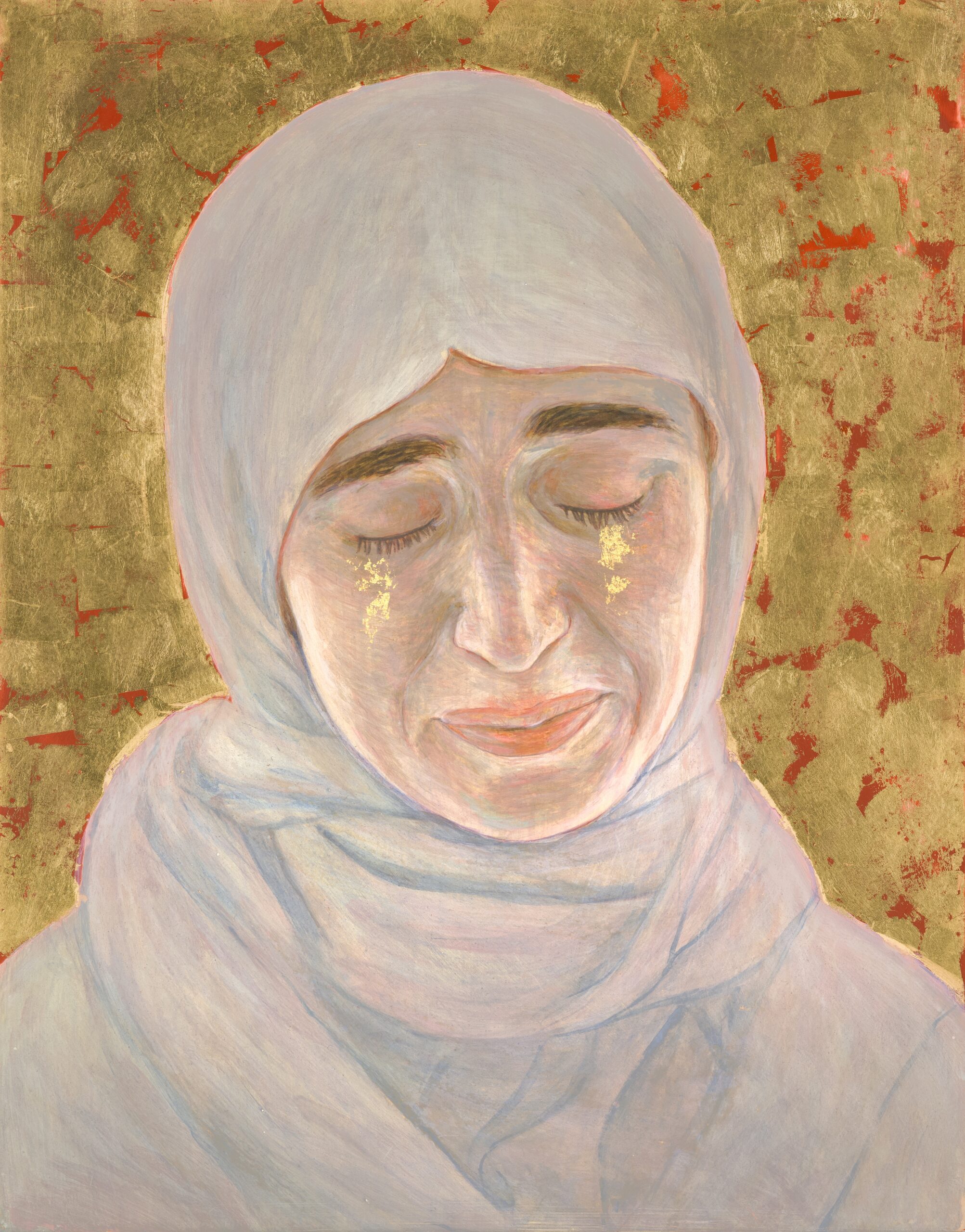
Tears of Gold
In a special exhibition to mark World Refugee Day, British artist Hannah Rose Thomas shows portraits revealing the trauma and resilience of women who have survived violence and displacement.
23 June 2022
When British artist Hannah Rose Thomas organized an art workshop in 2017 for Yazidi women who had escaped ISIS captivity, many chose to depict themselves crying tears of gold. A year later at an art therapy session in northern Nigeria, a group of women who had survived sexual violence used the same visual metaphor.
This poignant symbol of their resilience and dignity in the face of unimaginable trauma struck a chord with Thomas, who has spent the last decade travelling the world meeting and painting women displaced by violence and conflict.
To mark World Refugee Day on 20 June, UNHCR, the UN Refugee Agency, is proud to support the launch of Tears of Gold, an exhibition in the UK Houses of Parliament featuring a powerful series of portraits of some of the women Thomas met.
The collection features Ukrainian women who have sought safety in the UK, Syrian refugees in Jordan, Rohingya women who fled violence in Myanmar, and the Nigerian and Yazidi women who inspired the title of the exhibition. With the number of people fleeing conflict and persecution around the world passing 100 million for the first time – and with women often exposed to the greatest risks during displacement – these portraits are a visual testimony not only of war and injustice, but also of humanity, dignity and resourcefulness.
When British artist Hannah Rose Thomas organized an art workshop in 2017 for Yazidi women who had escaped ISIS captivity, many chose to depict themselves crying tears of gold. A year later at an art therapy session in northern Nigeria, a group of women who had survived sexual violence used the same visual metaphor. This poignant symbol of their resilience and dignity in the face of unimaginable trauma struck a chord with Thomas, who has spent the last decade travelling the world meeting and painting women displaced by violence and conflict. To mark World Refugee Day on 20 June, UNHCR, the UN Refugee Agency, is proud to support the launch of Tears of Gold, an exhibition in the UK Houses of Parliament featuring a powerful series of portraits of some of the women Thomas met. The collection features Ukrainian women who have sought safety in the UK, Syrian refugees in Jordan, Rohingya women who fled violence in Myanmar, and the Nigerian and Yazidi women who inspired the title of the exhibition. With the number of people fleeing conflict and persecution around the world passing 100 million for the first time – and with women often exposed to the greatest risks during displacement – these portraits are a visual testimony not only of war and injustice, but also of humanity, dignity and resourcefulness.
Photo © UNHCR/Raj Gedhu
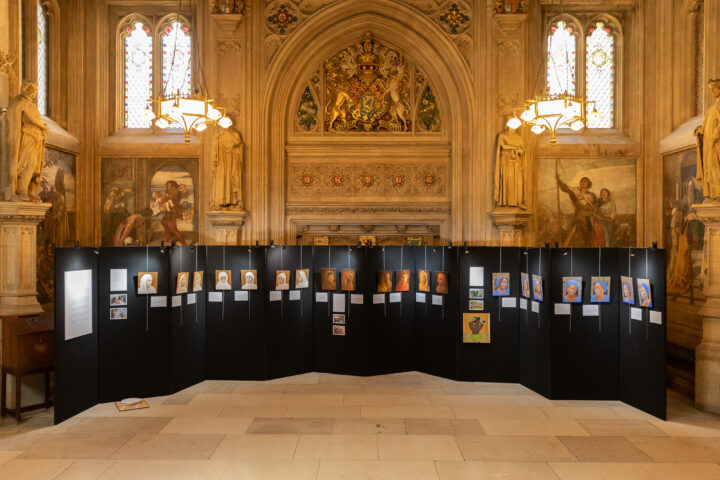
“These women were, and are, survivors.”
“These women were, and are, survivors. Their lives cannot be reduced to a single violent experience. Through my portraits of these courageous women, I have attempted to convey the person behind the trauma; their extraordinary resilience and dignity. The hope was that these paintings would be shown in places of influence to enable these women’s voices to be heard, to advocate on their behalf,” says Thomas.
Photo © UNHCR/Raj Gedhu
“These women were, and are, survivors.”
“These women were, and are, survivors. Their lives cannot be reduced to a single violent experience. Through my portraits of these courageous women, I have attempted to convey the person behind the trauma; their extraordinary resilience and dignity. The hope was that these paintings would be shown in places of influence to enable these women’s voices to be heard, to advocate on their behalf,” says Thomas.
United Kingdom
The war in Ukraine has created the fastest growing and one of the largest displacement crises in the world today. More than 5 million refugees from Ukraine have been recorded across Europe, including some 70,000 who have arrived in the UK.
Thomas recently met Maria and her mother Nadiia, who fled to Britain from Ukraine in March, resulting in a portrait that reveals the strength and support they offer one another despite the strain of fleeing their home.
United Kingdom
The war in Ukraine has created the fastest growing and one of the largest displacement crises in the world today. More than 5 million refugees from Ukraine have been recorded across Europe, including some 70,000 who have arrived in the UK.
Thomas recently met Maria and her mother Nadiia, who fled to Britain from Ukraine in March, resulting in a portrait that reveals the strength and support they offer one another despite the strain of fleeing their home.
Maria and Nadiia
“It doesn’t matter what nationality you are. Humanity has no geography and kindness has no nationality.”
Maria and Nadiia were at home in Kyiv when the war began on 24 February. Maria was woken by her mother bursting into her room telling her that the bombing had started. They spent the first twelve terrifying days of the conflict hiding in the basement of their building as a makeshift bomb shelter, before taking the decision to leave the country and seek refuge in the UK. Maria says she and her mother have found kindness at every turn on their journey to safety.
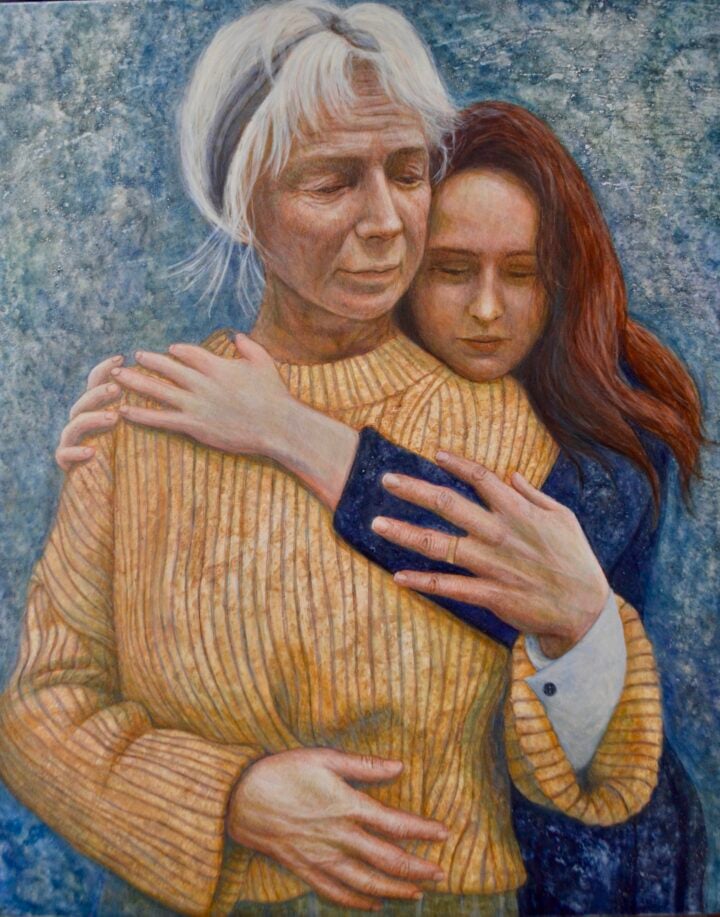
Maria and Nadiia
“It doesn’t matter what nationality you are. Humanity has no geography and kindness has no nationality.”
Maria and Nadiia were at home in Kyiv when the war began on 24 February. Maria was woken by her mother bursting into her room telling her that the bombing had started. They spent the first twelve terrifying days of the conflict hiding in the basement of their building as a makeshift bomb shelter, before taking the decision to leave the country and seek refuge in the UK. Maria says she and her mother have found kindness at every turn on their journey to safety.
Dohuk, Kurdistan Region of Iraq
In August 2017, Thomas led an art project with clinical psychologist Dr Sarah Whittaker-Howe for a group of Yazidi women who had been held in captivity by ISIS militants.
It is estimated that more than 6,000 Yazidi women and girls were kidnapped and sold as slaves, being held for months or even years. Many were subjected to imprisonment, torture and systematic rape, as part of a campaign of persecution that the UN has deemed a genocide and a crime against humanity.
Dohuk, Kurdistan Region of Iraq
In August 2017, Thomas led an art project with clinical psychologist Dr Sarah Whittaker-Howe for a group of Yazidi women who had been held in captivity by ISIS militants.
It is estimated that more than 6,000 Yazidi women and girls were kidnapped and sold as slaves, being held for months or even years. Many were subjected to imprisonment, torture and systematic rape, as part of a campaign of persecution that the UN has deemed a genocide and a crime against humanity.
Waso
“Listen, you will act like you’re crazy so you can survive.”
Waso, 15, cries uncontrollably while recounting the day her mother told her to act as if she were mentally disturbed to escape ISIS captivity.
She explains that at that time, ISIS were releasing women and girls who were deemed undesirable, and therefore could not be sold as slaves.
She smiles often, expressing gratitude that she managed to escape, but underneath is a profound pain caused by the separation from her mother and the knowledge that her missing father and brothers were likely killed.
Waso
“Listen, you will act like you’re crazy so you can survive.”
Waso, 15, cries uncontrollably while recounting the day her mother told her to act as if she were mentally disturbed to escape ISIS captivity.
She explains that at that time, ISIS were releasing women and girls who were deemed undesirable, and therefore could not be sold as slaves.
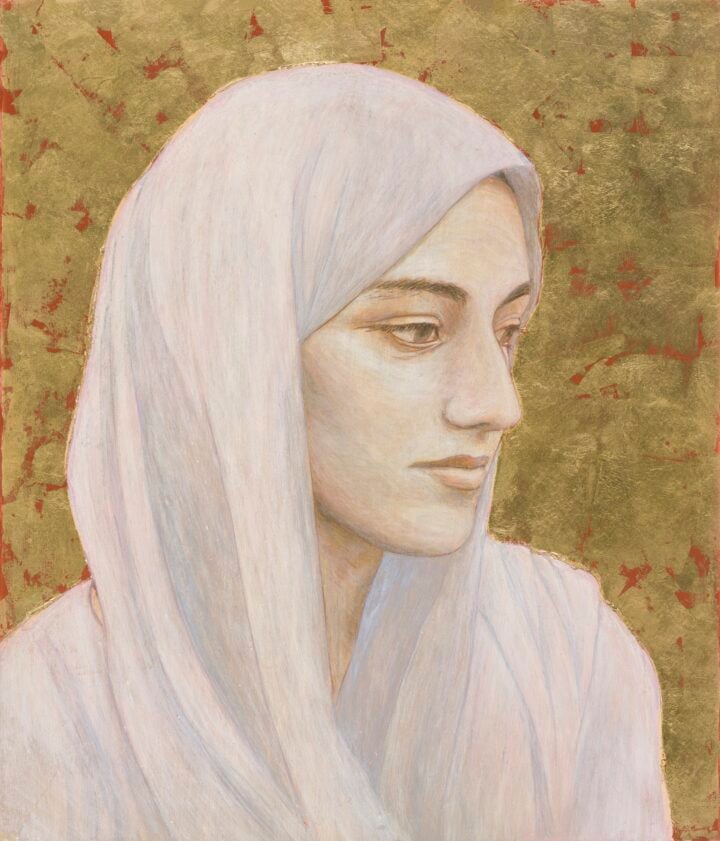
She smiles often, expressing gratitude that she managed to escape, but underneath is a profound pain caused by the separation from her mother and the knowledge that her missing father and brothers were likely killed.
Fahima
“I cannot express the sorrow to you when they took my child from me. I cannot find words that tell you what I feel not knowing where my child is.”
Fahima’s son was nearly 4 years old when he was taken by ISIS in 2014. She has not seen or heard from him since.
Fahima was taken to Syria and imprisoned for a year, giving birth to her second child there.
She was never bought by an ISIS fighter, and believes this was because she was not considered as beautiful as the other girls. She used to regularly cut her long eyelashes to deter potential buyers.
Fahima
“I cannot express the sorrow to you when they took my child from me. I cannot find words that tell you what I feel not knowing where my child is.”
Fahima’s son was nearly 4 years old when he was taken by ISIS in 2014. She has not seen or heard from him since.
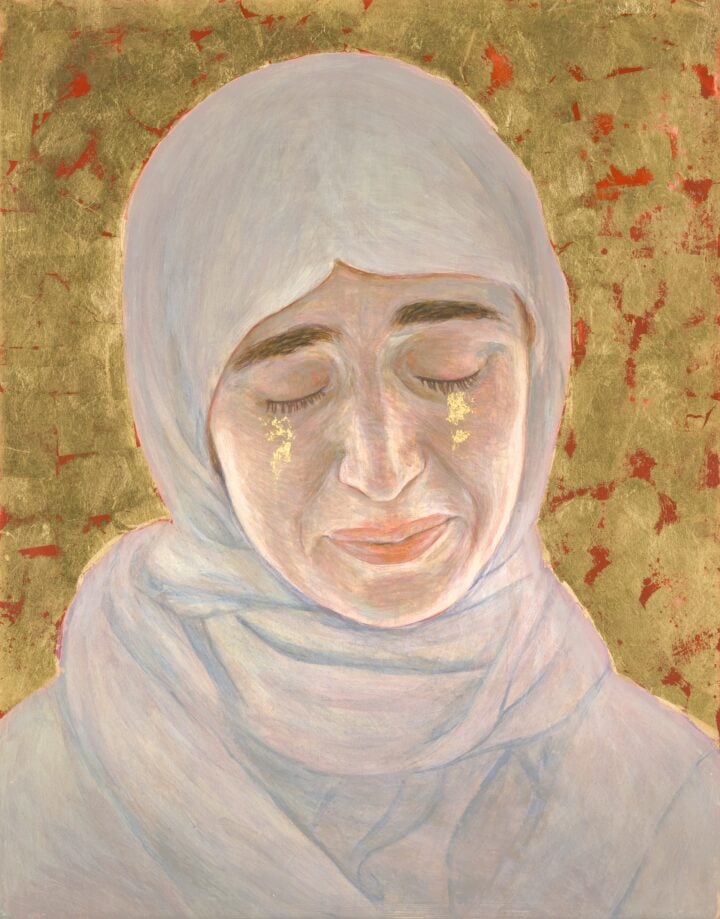
Fahima was taken to Syria and imprisoned for a year, giving birth to her second child there.
She was never bought by an ISIS fighter, and believes this was because she was not considered as beautiful as the other girls. She used to regularly cut her long eyelashes to deter potential buyers.
Cox’s Bazar, Bangladesh
In April 2018, Thomas visited the refugee camps in Cox’s Bazar, Bangladesh, where most of the nearly one million Rohingya refugees who fled violence in neighbouring Myanmar now live.
During her time in the Kutupalong refugee camp, Thomas spent her mornings painting with children in one of 200 child-friendly spaces run by local NGO BRAC.
Her afternoons were spent meeting Rohingya women and listening to their stories. Following her return from Bangladesh, Thomas painted portraits of some of the women she met.
Cox’s Bazar, Bangladesh
In April 2018, Thomas visited the refugee camps in Cox’s Bazar, Bangladesh, where most of the nearly one million Rohingya refugees who fled violence in neighbouring Myanmar now live.
During her time in the Kutupalong refugee camp, Thomas spent her mornings painting with children in one of 200 child-friendly spaces run by local NGO BRAC.
Her afternoons were spent meeting Rohingya women and listening to their stories. Following her return from Bangladesh, Thomas painted portraits of some of the women she met.
Lalu
“I look much older than my age, because of the sorrow and suffering I have seen.”
During an attack on Lalu’s village, she and her family were forced into one of the houses and told they would be burned alive.
While more people were being rounded up, Lalu’s family made their escape. One of her nephews died when his clothes caught fire and one of her grandchildren was shot as they fled. Her remaining family arrived at the river that marks the border with Bangladesh and crossed by boat.
But they were pursued by a speedboat and the family’s boat sank, killing Lalu’s grandson.
Lalu’s husband narrowly avoided drowning, but swallowed large quantities of river water and died soon after they arrived at the camp.
Lalu feels unspeakable grief at the loss of her loved ones and has been unable to move on, her mental and physical health increasingly frail.
Lalu
“I look much older than my age, because of the sorrow and suffering I have seen.”
During an attack on Lalu’s village, she and her family were forced into one of the houses and told they would be burned alive.
While more people were being rounded up, Lalu’s family made their escape. One of her nephews died when his clothes caught fire and one of her grandchildren was shot as they fled. Her remaining family arrived at the river that marks the border with Bangladesh and crossed by boat.
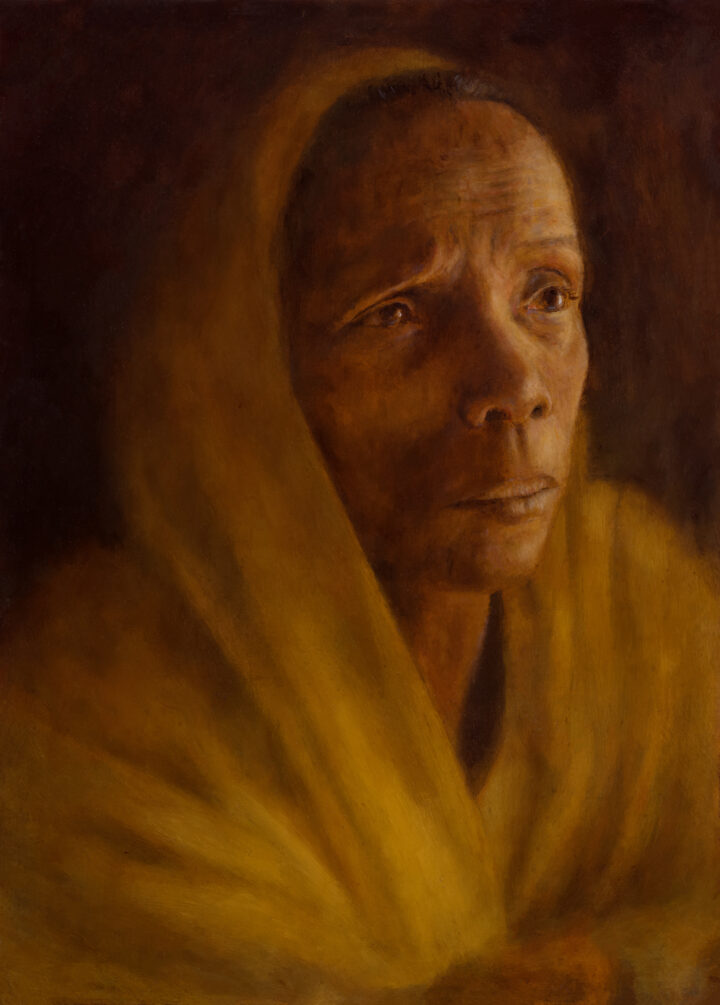
But they were pursued by a speedboat and the family’s boat sank, killing Lalu’s grandson.
Lalu’s husband narrowly avoided drowning, but swallowed large quantities of river water and died soon after they arrived at the camp.
Lalu feels unspeakable grief at the loss of her loved ones and has been unable to move on, her mental and physical health increasingly frail.
Norbaku
“We had never known hunger before we were forced to flee”
Norbaku and her family were well off in Myanmar; their home was large and spacious.
In Kutupalong, her large family is squeezed into a shelter the size of their former chicken coop.
The family fled when their home was attacked and her husband was caught and severely beaten.
The family managed to bring him with them to Bangladesh but he still struggles to breathe, eat or drink due to the pain caused by his injuries and grows thinner and weaker every day.
Norbaku
“We had never known hunger before we were forced to flee”
Norbaku and her family were well off in Myanmar; their home was large and spacious.
In Kutupalong, her large family is squeezed into a shelter the size of their former chicken coop.
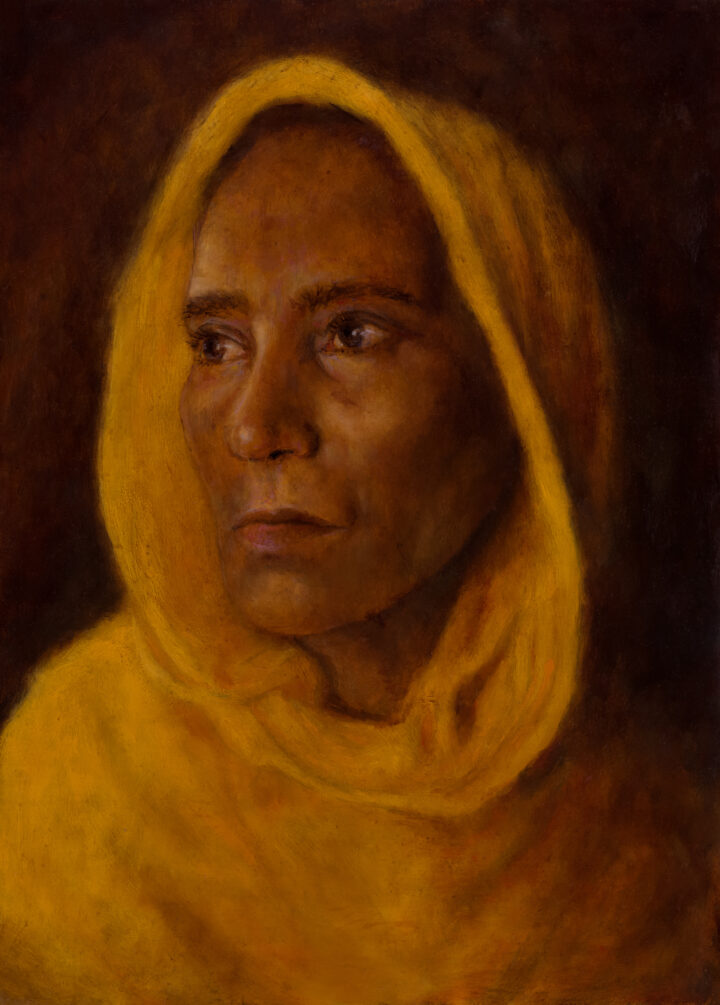
The family fled when their home was attacked and her husband was caught and severely beaten.
The family managed to bring him with them to Bangladesh but he still struggles to breathe, eat or drink due to the pain caused by his injuries and grows thinner and weaker every day.
Northern Nigeria
In September 2018, Thomas travelled to northern Nigeria to take part in a trauma healing programme with nine women who had experienced sexual violence at the hands of extremist groups.
The project empowered the women to use art to share their stories and process their trauma. Many of the women also chose to paint their portraits with tears of gold.
For her portraits, Thomas used early Renaissance tempera and Byzantine icon painting techniques, with patterns in gold leaf inspired by the indigo-dyed fabric made in the region.
Northern Nigeria
In September 2018, Thomas travelled to northern Nigeria to take part in a trauma healing programme with nine women who had experienced sexual violence at the hands of extremist groups.
The project empowered the women to use art to share their stories and process their trauma. Many of the women also chose to paint their portraits with tears of gold.
For her portraits, Thomas used early Renaissance tempera and Byzantine icon painting techniques, with patterns in gold leaf inspired by the indigo-dyed fabric made in the region.
Esther
“People mocked me and said that Rebecca (Esther’s daughter) is of Boko Haram and many other cruel things … How people treat her really makes my heart ache.”
Esther and her family were hiding in caves in the hills surrounding their village, in fear of Boko Haram. When she returned to the village one day for food, Boko Haram attacked and she was taken into the Sambisa Forest, where the Chibok schoolgirls were also held
Esther remained in captivity for three and a half years. She was sold as a slave and forced to become the fourth wife of a Boko Haram leader.
When he was killed, Esther and the other wives escaped, trekking barefoot for three days without food or water. Esther was seven months pregnant.
After returning to her village in Maiduguri, Esther’s family tried to make her abort the baby, but she refused. After Rebecca was born her family rejected her, calling her ‘Boko’.
Esther
“People mocked me and said that Rebecca (Esther’s daughter) is of Boko Haram and many other cruel things … How people treat her really makes my heart ache.”
Esther and her family were hiding in caves in the hills surrounding their village, in fear of Boko Haram. When she returned to the village one day for food, Boko Haram attacked and she was taken into the Sambisa Forest, where the Chibok schoolgirls were also held
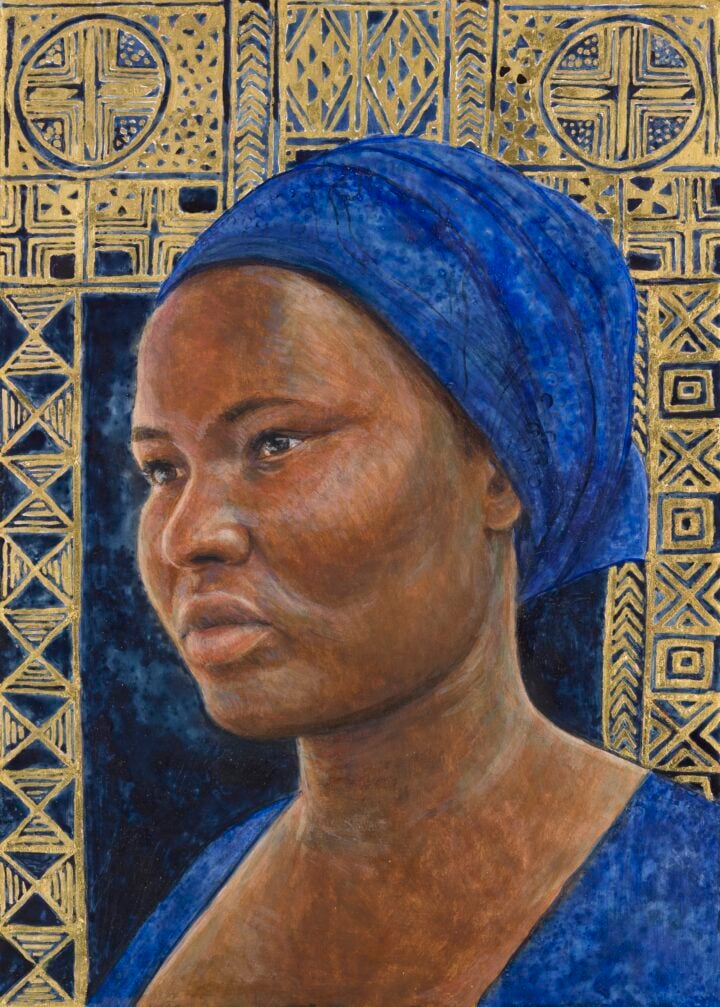
Esther remained in captivity for three and a half years. She was sold as a slave and forced to become the fourth wife of a Boko Haram leader.
When he was killed, Esther and the other wives escaped, trekking barefoot for three days without food or water. Esther was seven months pregnant.
After returning to her village in Maiduguri, Esther’s family tried to make her abort the baby, but she refused. After Rebecca was born her family rejected her, calling her ‘Boko’.
Christiana
“They held guns and surrounded me. I became so frightened at that moment. When they raped me, I was bleeding because I was very weak and heavily pregnant.”
Christiana was eight months pregnant when armed men broke into her home. They demanded to sleep with her, saying that if she refused, they would kill her and cut her to pieces.
“Two men raped me; the other three said they can’t because I’m pregnant,” she said. Her husband was tied up and made to watch. “My husband was there, right there.”
Bleeding and bruised, Christiana was taken by her husband to hospital, where she gave birth to her daughter Gloria, whom she calls her “miracle baby”.
Christiana
“They held guns and surrounded me. I became so frightened at that moment. When they raped me, I was bleeding because I was very weak and heavily pregnant.”
Christiana was eight months pregnant when Fulani herdsmen broke into her home. They demanded to sleep with her, saying that if she refused, they would kill her and cut her to pieces.
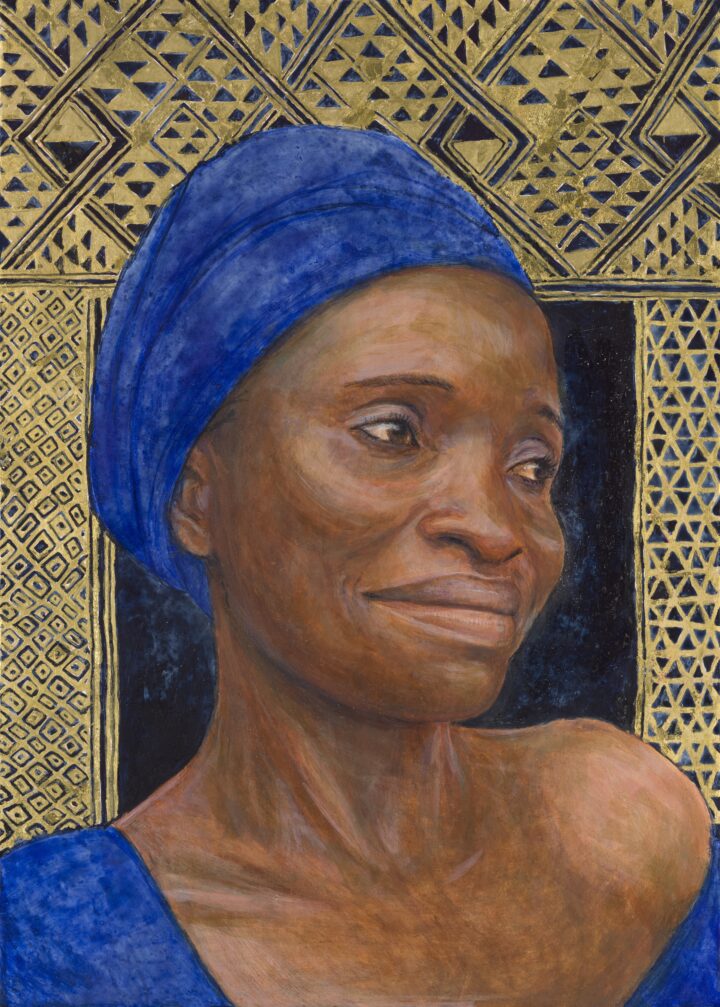
“Two men raped me; the other three said they can’t because I’m pregnant,” she said. Her husband was tied up and made to watch. “My husband was there, right there.”
Bleeding and bruised, Christiana was taken by her husband to hospital, where she gave birth to her daughter Gloria, whom she calls her “miracle baby”.
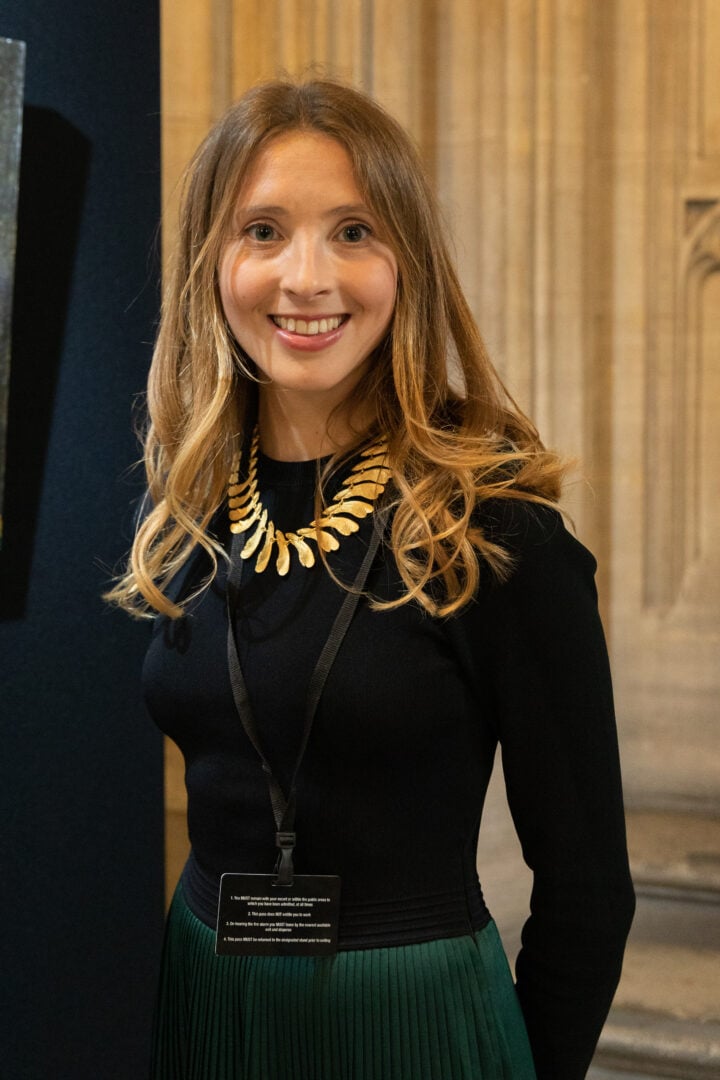
About the artist
Thomas’ work has been exhibited at prestigious venues such as the UK Houses of Parliament, Scottish Parliament, European Parliament, Buckingham Palace, Lambeth Palace, Westminster Abbey and The Saatchi Gallery.
Thomas was selected for Forbes 30 Under 30 2019 and Vogue Future Visionaries 2022 for her work using art as a powerful tool for advocacy. She is currently a UNESCO ‘Art-Lab for Human Rights and Dialogue’ PhD Scholar at the University of Glasgow.
Photo © UNHCR/Raj Gedhu
About the artist
Thomas’ work has been exhibited at prestigious venues such as the UK Houses of Parliament, Scottish Parliament, European Parliament, Buckingham Palace, Lambeth Palace, Westminster Abbey and The Saatchi Gallery.
Thomas was selected for Forbes 30 Under 30 2019 and Vogue Future Visionaries 2022 for her work using art as a powerful tool for advocacy. She is currently a UNESCO ‘Art-Lab for Human Rights and Dialogue’ PhD Scholar at the University of Glasgow.
Photo © UNHCR/Raj Gedhu
